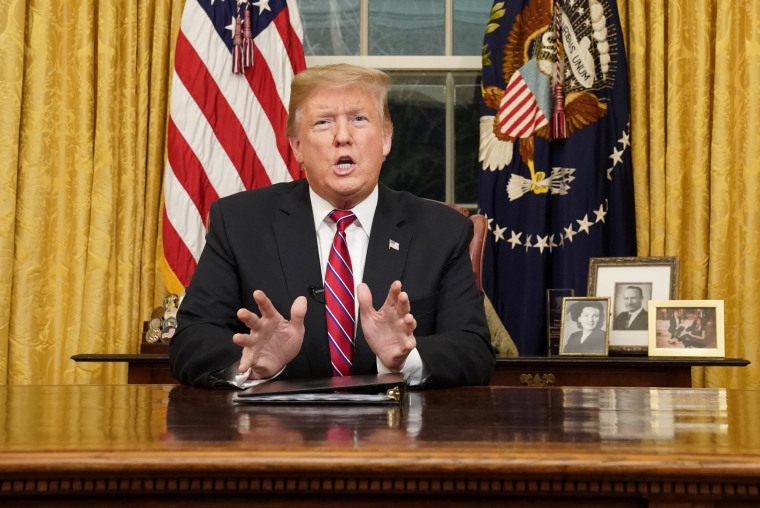President Donald Trump's address on Tuesday night, lacking in much new information and containing several inaccuracies, spurred renewed criticism from the left and from Democrats of the networks' decision to pre-empt their prime-time programming and air the speech.
On Twitter, those critiques tended to center an a particular word: "Played."
"The networks got played," tweeted liberal media watchdog Media Matters.
"The television networks should be embarrassed for putting this on tonight," tweeted Tagean Goddard, publisher of politics blog Political Wire. "They got played big time."
"Get smart, media. You got played," tweeted David Pepper, chairman of the Ohio Democratic Party.
The major broadcast networks — ABC, CBS, NBC and Fox — had already come under fire for granting Trump airtime for a speech on U.S. immigration. Network officials told NBC News that the newsworthiness of Trump's address — coming in the midst of one of the longest government shutdowns in U.S. history — outweighed concerns that he would use the opportunity to spread falsehoods.
How Trump is covered by the networks, cable news and the media more broadly remains a contentious topic, particularly as the news cycle for the 2020 elections begins.
While Trump did make some questionable claims, many major media outlets including the networks were ready with fact-checks, many of which came shortly after Trump's address.
But the damage, according to critics, was done.
"Bottom line: The networks interrupted their entertainment fare for the lamest rerun on national television: Trump's immigration talking points," tweeted Erik Wemple, a liberal media columnist at The Washington Post.
"Shame on you, networks. Shame on you," tweeted Jeff Jarvis, a journalism professor at the City University of New York.
Journalist James Fallows, who wrote in The Atlantic before the address about why the networks shouldn't give Trump the air time, tweeted afterward that the "decision to air this presentation looks worse after-the-event than it did before."
Margaret Sullivan, media columnist for The Washington Post, wrote that she hopes the networks' executives learn from the address and spend the day "in their spacious offices practicing a simple word: No."
Other critics pointed to the problematic content of Trump's speech, which did not contain any new announcements, contained some false assertions and sought to perpetuate the myth that undocumented immigrants are prone to violence.
"The networks let themselves be used to broadcast a dog whistle," tweeted Dan Froomkin, editor of the left-leaning White House Watch blog.
Trump's re-election campaign launched a fundraising effort off the speech.
"Network executives can’t be happy," said Joe Lockhart, former White House press secretary for President Bill Clinton and a vice chairman of public affairs at Edelman, a public relations agency, in an interview. "No news and Trump sent multiple fund-raising texts.”
A handful of journalists defended the networks' decision.
"My unpopular opinion is that it's a good thing for the nation's leaders to go on national television and offer their competing arguments," tweeted Binyamin Appelbaum, a Washington correspondent for The New York Times. "How is this a waste of airtime? Have you seen what they show the rest of the time?"
Network representatives declined comment or did not return requests for comment on their decisions to let Trump speak to the nation.
The broadcast networks shifted back to regularly scheduled programming quickly after the Democratic rebuttal from House Speaker Nancy Pelosi, D-Calif., and Senate Minority Leader Chuck Schumer, D-N.Y., an indication of just how little news Trump delivered.
The four broadcast networks and three cable news channels provided Trump with an estimated $17.7 million of airtime, according to Apex Marketing Group, a company that tracks the value of airtime for corporations. The company calculated the value of the Democratic response at $9 million. Trump's speech was just over nine minutes long while the rebuttal was over four minutes.
While the TV ratings are yet to be tallied, Eric Smallwood, the president of Apex Marketing, said that the firm came up with the numbers after looking at the ratings for prior prime-time speeches delivered by Trump and by calculating at what the networks would typically charge for their regular schedules.
ABC was the first to cut back to regularly scheduled programming, with NBC airing just a few minutes of analysis before telling viewers to switch to its cable channel, MSNBC at 9:25 p.m. ET. CBS, with a news division now under a new president, Susan Zirinsky, lingered a little longer before returning to programming by 9:30 p.m. ET.
The broadcast network Fox, which doesn’t always air presidential addresses, used Fox News anchors Shepard Smith and Chris Wallace to critique the speech while Sean Hannity covered it for the Fox News cable channel.
Smallwood said he was surprised to see how quickly the broadcast networks switched away from the event.
“What was unique was that TV stations were anxious to get back to programming," he said. "They were done. There was nothing new.”

